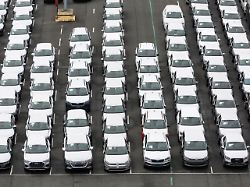Corporations with sales jumps
German car industry defies overall economic situation
8/11/2023 4:06 p.m
After a very strong previous year, the air for many DAX companies is now very thin, say experts. The exception is the auto industry, which has had a strong first half of the year. However, future prospects are not particularly rosy.
The automotive industry has remained the growth engine for the German economy in recent months: the car manufacturers’ sales and profits rose sharply in the second quarter. The industry’s exports increased significantly in the first six months. However, the consulting company EY is already warning of a deterioration in the situation in the second half of the year.
The car companies have benefited from the decreasing lack of chips with high prices and continue to make high profits, especially with combustion engines, explained Mathieu Meyer from EY. They still have well-filled order books and are benefiting from improved availability of semiconductors and other primary products.
In the earnings ranking of the 40 largest listed companies by EY, Volkswagen, Mercedes-Benz and BMW took first, third and fourth place with 5.6 billion euros, 5.0 billion euros and 4.3 billion euros in the second quarter. Deutsche Telekom came in second with a profit of EUR 5.2 billion. The sales of the car companies in Europe increased by 21 percent.
Cars as the most important export goods
The Federal Statistical Office in Wiesbaden reported that cars and car parts were Germany’s most important export goods in the first half of the year – exports also rose by almost 16 percent to a value of 136.5 billion euros. The export of machines also flourished.
Overall, according to EY, the situation of the large corporations in Germany is rather poor. “Many companies are feeling the weak economic development more and more,” explained Henrik Ahlers from EY. The total sales of the 40 companies listed in the German share index (DAX) rose in the second quarter by 1.1 percent compared to the same period last year to around 446 billion euros, the operating profit of the companies by almost three percent to 40.5 billion euros. Both percentage values were therefore below the inflation rate.
In 14 of the 40 companies, sales also fell compared to the previous year, and in 18 the profit. “After a very strong previous year, the air has now become very thin for many companies,” summarized Ahlers from EY. “It’s getting harder and harder to maintain the high level of profits we’ve achieved.”
Customer willingness to buy decreases
The wind is also blowing more and more in the face of the car industry, analyzed EY. Incoming orders are weak, and in view of the high inflation, increasing concerns about the economy and the persistently high level of interest rates, customers are less willing to buy. “Overcapacity and discounts could therefore soon put pressure on margins again.”
Overall, Ahlers also expects that the second half of the year will be even more difficult than the first. Growth impulses are not in sight, the low sales growth is being more than eaten up by the persistently high inflation. “In fact, we are already dealing with negative growth in many cases.”
The EY expert warned that the cost problem in Germany was becoming “more and more pressing”: Above all, the high energy prices led to investments being postponed and consideration being given to relocating production abroad. “This trend is also reinforced by the very complex and lengthy approval procedures in this country. There is no sign of any reduction in bureaucracy.”
